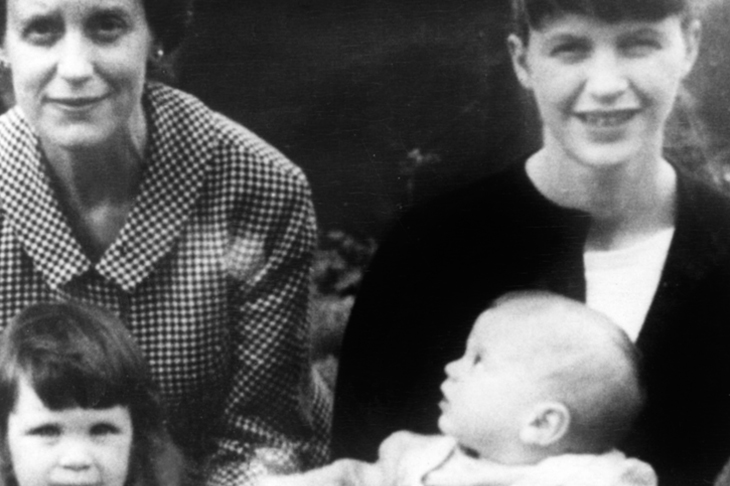In a 1974 interview celebrating the quarter century since the publication of her classic The Second Sex (1949), Simone de Beauvoir recalled a eureka moment in which she saw that ‘to change the value system of society was to destroy the concept of motherhood’. That ‘value system of society’ rested on what she saw as enforced maternity, whereby women — whether through physical, psychological or social pressure — were pressed into humiliating servitude, a world of narrowed horizons and debasing physical shame. A mother was ‘alienated in her body and her social dignity’ and, finally, complicit in propping up a violent, corrupt and tenacious system of patriarchy, as well as capitalism itself (though unlike many to follow, De Beauvoir didn’t think capitalism was unique in degrading and enslaving women).
Jacqueline Rose has followed De Beauvoir’s lead — though unlike the ‘mother’ of feminists she does not see motherhood as inherently limiting; rather as murderously misunderstood. Mothers is an analysis of this misunderstanding, and a kind of J’accuse of the world’s political, ethical and sexual cruelties, seen at their clearest, maintains Rose, in its symbolic and actual treatment of mothers.
The thing to know before reading anything by Rose, a celebrated essayist, literary critic and feminist, now based at Birkbeck, is that she’s an adherent of psycho-analysis. This means that her interpretation of the world is largely refracted through the (unverifiable) power of the unconscious rather than empirical evidence. Not that this has ever hampered her political confidence or ferocity on matters one might think would lie outside the purview of psycho-analysis. Quite the contrary: in The Question of Zion, for instance, her masterwork of consuming anti-Zionism, published in 2005, her anti-Israel convictions and psychoanalysis furiously egg each other on, leading her to liken the Israeli treatment of Palestinians to the Holocaust.
Mothers’ psychoanalytically infused ‘argument’ is the idea that ‘motherhood is, in Western discourse, the place in our culture where we lodge, or rather bury, the reality of our own conflicts, or what it means to be fully human’. In other words, we both idealise and scapegoat mothers, leading us to heap impossible expectations and cruel habits both of mind and practice on them. As Nancy Chodorow and other feminist psychoanalysts have also noted, mothers strain under the expectation to be perfect, clean and full of love. Glimpses of maternal sexuality, anger, irresponsibility or violence are therefore appalling. But to Rose, it is precisely in acknowledging this ‘dark underside’ of maternal love that the possibility of a less violent world begins to emerge. The more we deny the messiness and bloody ‘humanity’ of mothers, the more we rig ourselves up for more violence, destruction and misery.
These themes are aired here across four sections — none of which does much to clarify what it actually means. The first, ‘Social Punishment’, begins with what Rose sees as the racist, sexist and anti-maternal British tabloid coverage of Bimbo Ayelabola, who in 2016 had a (free) £145,000 caesarean section at Homerton Hospital, London, to deliver her quintuplets while on a visit from Lagos. Unsupportive headlines prove that, in Rose’s reading, mothers in Brexit Britain are being held unjustly responsible for ‘the ills of the world’.
Rose then switches to ancient Greece, with the violent griefs of Clytemnestra and Medea ‘shattering a myth of collective innocence’. In the next section, ‘Loving’, the impossible and often paradoxical expectations of motherhood are tackled with reference to Roald Dahl, Virginia Woolf, Hannah Arendt, Toni Morrison and Rachel Cusk, whose 1997 account of the annihilating experience of becoming a mother Rose finds particularly suggestive.
The third section, ‘Psychic Blindness’, covers maternal hatred, which is given psychoanalytic grounding in D.W. Winnicott’s Hate in the Countertransference (1949), which lists 18 reasons a mother must hate her baby. From here onwards, the book is really about mothers and daughters, since, presumably, daughters muddy the boundary between the maternal ‘me’ and ‘you’ more than sons. But the ensuing discussion of Sylvia Plath and her strained relationship with her mother Aurelia hardly clarifies anything. Instead, the discussion of the Plath tragedy and its ‘implications’ generates an opaque rhetorical question: ‘What on earth do we expect, as long as society continues to believe it has the right to trample over the mental lives of mothers?’
Answers to similarly unwieldy, abstract questions are demanded of the novels of Elena Ferrante, author of the bestselling Neapolitan quartet. Her visceral, bloody and powerful depiction of maternity garners her a whole chapter in the book’s final section, ‘The Agony and the Ecstasy’. For Rose, Ferrante’s mothers in all their wild, shape-shifting power point towards nothing less than a ‘foundation for a different ethics, and, perhaps, a different world’.
As the Ferrante chapter makes clear, one of main problems with this book is that, in skidding across a vast literature on motherhood, from theory, criticism, news stories, plays and novels, Rose reveals a strange disregard for the differences between types of evidence. Surely the plot of a novel does not offer the same kind of data as a Freudian dictum, a poem, a news clipping, or a social survey.
Psychoanalytical or not, some respect for empiricism would have vastly improved the arguments of this unfocused, rhetorically loaded and curiously lazy-feeling book.







Comments